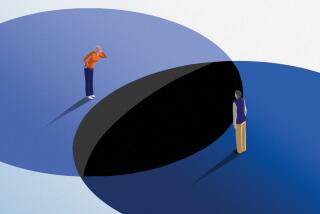Who Knew Math Was So Prime Time
- Share via
Problem: calculate the odds that a drama featuring forensic mathematics would find ratings success in prime-time network TV. Factor improbability based on casting of Judd Hirsch. Express answer in scientific notation. Show your work.
“Numb3rs”--a police procedural where standard deviations meet standard deviants--deploys some hot, hip mathematics and one very old idea. “The passions of hatred, anger, envy,” wrote the Dutch philosopher Baruch Spinoza, obey natural law. “I shall consider human actions and desires in exactly the same manner, as though I were concerned with lines, planes and solids.”
Coming soon: “CSI: Amsterdam.”
I’m in no position to judge the quality of math practiced on “Numb3rs” (the value of that statement approaches infinity), but numbers-crunchers cannot help but be pleased. Finally, in the character of Charlie Eppes, played with sweet, tousled sagacity by David Krumholtz, mathematicians are portrayed as something other than fitful lunatics, feral janitors or, in the case of Jeff Goldblum’s Dr. Ian Malcolm in “Jurassic Park,” fashion victims. Also it must please them that one of their own could possibly kick down a door and kill someone with a big scientific calculator. Whap! Revenge of the Nerds.
If Eppes is a break from convention, his counterpart on the show is convention in corduroys. Played for comic relief, Dr. Larry Fleinhardt--another 40-year-old virgin--wanders through scenes, his hair pillow-combed, his head a storm of abstractions, a man whose brain has slipped a decimal point. And P.S., Fleinhardt is supposed to be a theoretical physicist, but he makes such a trivial hash of quantum theory that Stephen Hawking would be well within his rights to run the scriptwriters over with his wheelchair.
As characters in fiction, mathematicians are almost always too smart for their own good: John Nash in “A Beautiful Mind,” the cipher-maniacal Max Cohen in “Pi,” and good Will Hunting. And not always in fiction, it’s true. Sir Isaac Newton was a God-haunted obsessive and agoraphobic; Alexander Grothendieck and Paul Erdos, both titans of 20th century math, were between eccentric and completely bughouse. Ted Kaczynski didn’t exactly polish the profession’s image, either.
“Mathematicians are insane,” observes Jake Gyllenhaal’s character Hal in the film “Proof,” based on the play by David Auburn. But they aren’t really--at least, no more so than professionals in any other demanding field--and it’s worth asking why we keep insisting they are.
Like John Nash, Gwyneth Paltrow’s Catherine in “Proof” is uncommonly good at sums. In between sleeping late and taking care of mad old dad, she manages some unspecified breakthrough in Germain primes that will, we’re told, change the face of mathematics. When her father, the great man of numbers played by Anthony Hopkins, dies, Catherine--like Nash--crosses into the theoretical boundary Zone X, where X equals the debilitation of an ungovernable genius.
Why is it that all fictional mathematicians are geniuses, like Catherine, or at a minimum brilliant, like Hal? Don’t math departments need merely competent mathematicians, if only to serve as department heads? And why do they seem to have such tempestuous work habits, scribbling sleeplessly through jags of insight and intuition? I’m pretty sure real-world mathematics is a rather more deliberate, if not leisurely, pursuit, a craft perfected over many years.
Speaking of theories, I have one. The entire apparatus of technology is built on higher mathematics, and yet few of us have even a passing conception of it. Math phobia is rampant, and innumeracy is so bad most Americans couldn’t tell you what a billion was if you paid it out to them in greenbacks. Math class, as Barbie was once famously programmed to say, is tough.
Never have so many relied on so few to tell us what the hell is going on. Mathematicians have acquired the status of hieratic otherness, a kind of geek priesthood, acting as intermediaries between the unfathomable and familiar. In “Proof,” the proof itself is never really explained; in fact, it seems conspicuously written around, presumably so as not to overwhelm moviegoers’ tiny brains. And yet something about it feels like the name Jehovah that cannot be spoken.
Mathematicians are portrayed as having seen the face of God, and often having been driven mad by it. The Max Cohen character in “Pi” is pursued by a kind of Hasidic Delta Force that thinks he has the 216-digit sequence that is the lost name of God. The thing is, mathematics is spooky. Backers of intelligent design could certainly cite the eerie recurrence of transcendental numbers in nature--of pi, of logarithmic spirals, Fibonacci sequences, and phi, the so-called “Golden Ratio.” Plato said, “God ever geometrizes.”
So it’s nice to see in the Charlie Eppes character a mathematician relatively unsinged by the holy heat of math. He’s a nice, normal college professor who sleeps at night and buttons his shirt correctly. Now if he could only get a girlfriend.
More to Read
The complete guide to home viewing
Get Screen Gab for everything about the TV shows and streaming movies everyone’s talking about.
You may occasionally receive promotional content from the Los Angeles Times.






